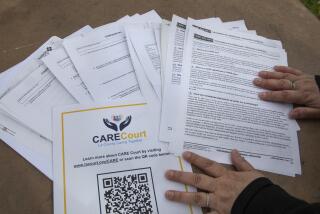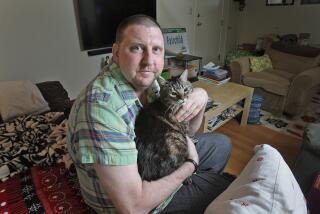Family Is Split Over Man’s Fate
- Share via
Olga Bernstein enters her husband’s hospital room and, as usual, gives her spouse of 26 years a peck on the cheek.
Then she sits next to the rail-thin, wordless man, takes his hand and apologizes.
“I am so sorry you are going through this,” she tells the man who used to write her long love letters before he disappeared into dementia. “I wish there was something I could do about it.”
Karl Bernstein, 76, doesn’t respond.
Diagnosed with advanced Alzheimer’s and Parkinson’s diseases, he hasn’t spoken to his wife, or anyone else, for at least four years.
If there’s a blessing to his condition, it’s that the retired Thousand Oaks nuclear engineer has no idea that wrenching decisions about how to treat him have split his family in two.
Olga, 53, wants her husband to be made comfortable and allowed to die when his time comes.
Her adult stepson, Scot Bernstein, 50, wants his doctors to do everything possible, including reviving him, to prolong his father’s life.
Complicating the picture is a legal battle three years ago that handed Scot Bernstein control of all medical decisions.
Olga has been fuming ever since, expressing her frustrations to her husband’s doctors and nurses, who say their hands are tied.
Olga and Scot have feuded over the type of nutrition that goes into Karl’s feeding tube. They’ve disagreed about how much pain medication he should receive to treat a deep bed sore on one leg.
Their enmity is so great that when Olga posted pictures of Karl with herself and the two sons they had together, Scot returned the next day with much larger photographs of himself and his father, she said.
All of this could have been avoided, experts say, if Karl had made his end-of-life wishes clear when he was able. His failure to do so triggered a family drama that shows no sign of letting up, they say.
“The Terri Schiavo case was a big wake-up call,” said Kathryn Tucker, an attorney with Compassion & Choices in Portland, Ore., of the controversy over the Florida woman’s death last year. “Agencies reported a big increase in requests for end-of-life forms. But people need to fill them out too.”
Schiavo’s husband and parents split over her care in a case that made national headlines for months and drew in President Bush.
Kris Carraway-Bowman, a spokeswoman at Los Robles Regional Medical Center in Thousand Oaks, where Bernstein is a patient, said hospital officials have seen little evidence that more people are armed with advance directives, living wills or other documents spelling out how much care they wish to receive when death is near.
“We haven’t seen much difference at all,” Carraway-Bowman said.
Nationally there is strong public support for the notion that gravely ill patients should sometimes be allowed to die.
A January survey by the Pew Research Center for the People & the Press found that 70% of Americans agreed there were circumstances when patients should be allowed to die, while 22% believed that doctors and nurses should always do everything possible to prolong life.
The same survey, taken eight months after Schiavo’s highly publicized death, also found that just 29% of the public had written down their end-of-life wishes. The number rose to 54% for people 65 and older.
A Los Robles administrator said that even with the strong emotions that typically accompany end-of-life decisions, the rancor surrounding Karl Bernstein’s illness is extreme.
“There are differences of opinion in families,” said Taran Sidhu, the hospital’s risk manager. “But something to this level is rare.”
If Olga had her way, her husband would have long ago been transferred to a skilled nursing facility or even a hospice to live out his final days without tubes and monitors attached to his body.
But she can’t do that.
In 2003, Scot, a Sacramento attorney, filed suit to take Karl’s healthcare decisions away from Olga. His petition for conservatorship was triggered, court records show, by Olga’s request that Karl be listed as a do-not-resuscitate patient when she placed him in a skilled nursing facility.
Olga spent $20,000 battling her stepson before she gave up the fight and allowed Scot to take over Karl’s medical care. She settled the case, Olga said, because her salary as a high school teacher could no longer cover the bills and she was close to a nervous breakdown.
Shortly after their April 2003 settlement, Olga was admitted to Northridge Hospital Medical Center for depression and underwent six rounds of electroconvulsive therapy.
The treatments “saved my life,” she said.
But now she lives with the conviction that in order to save herself she has failed her husband. She also worries about the effect of the last three years on the two sons she and Karl had together: Ilya, 22, and Nick, 19.
Ilya, an anthropology major at UC Berkeley, said it was tough watching his mother fall apart.
“On top of everything that happens when you lose the love of your life, she had to deal with the stress of a court battle,” he said. “She was so depressed that she was suicidal.”
Nick, who majors in math and science at UC Santa Barbara, said the trauma has kept him away from his father’s hospital room.
He wants to remember his dad as the robust and intellectually curious man of his youth, Nick said, and not someone “who is not really living.”
“We used to go camping a lot, and Scot would always be at our house for family functions,” Nick recalled. “Scot was just fun to be around. I don’t know what happened.”
Scot declined to discuss the lawsuit or whether he intends to indefinitely demand intensive treatment for his father, calling it a private matter.
But in court papers, he has asserted that he was only carrying out his father’s wishes. In their conversations, Scot said in court documents, his father discussed other relatives who had died and said he thought they had given up too early.
Regardless of what the son’s personal motivations are, the legal settlement means that hospital officials must defer to Scot to make all medical decisions on behalf of his father.
Los Robles administrators and Karl’s doctors declined to discuss his condition other than to say he is stable.
“Clinically, everything is being done appropriately,” said Carraway-Bowman, the hospital spokeswoman.
During a recent visit, Karl appeared frail and thin, with a tracheotomy tube in his neck. His eyes were closed and he did not visibly respond when Olga spoke with him.
She said her husband sometimes opens his eyes or moans but is otherwise uncommunicative.
Olga is convinced that her husband is in pain, though hospital administrators said it is hard to say whether he is suffering physically.
“It’s a family dispute, yes,” Olga said. “But why does Karl have to suffer?”
Olga believes that if her scientist husband had known the grief his illness would cause, he would have made an advance directive or a living will. Experts in end-of-life care recommend discussing death issues not only with a spouse, but with a family doctor and several family members.
“He was a very brilliant man but a very realistic man too,” she said. “He understood that life ends.”
Olga said she was immediately drawn to Karl’s kind and gentle nature when they met in 1980. The two married despite their 23-year age difference and raised two sons in their modest Thousand Oaks home.
Karl worked for several defense contractors but preferred working on his own projects at home, Olga said. She supplemented their income teaching at Royal High School in Simi Valley.
Around 1998, Karl began having trouble with his balance and started forgetting things. Olga cared for him in their home while also holding down her full-time job and raising their sons.
By fall 2002, however, Olga could no provide the round-the-clock care that Karl needed. He was forgetting to eat, misplacing things and starting to fall down.
She placed him in a skilled nursing facility close to home so she and his sons could frequently visit. Within two months of his leaving home, however, Scot filed his legal petition seeking conservatorship.
In a hearing held one day after Olga received the initial filing, a Ventura County judge named Scot as the temporary conservator, court records show. Olga filed a counter petition, and the two sides battled it out over the next three months.
What mystifies Olga to this day, she said, is Scot’s motive for keeping his father alive.
Her opinion is that her stepson, who is unmarried and lost his mother several years ago, has no one else in his life. Scot flies down to Thousand Oaks frequently so that he can spend time with his father, she said.
Olga usually visits Karl during the day and Scot takes over in the late evening. He will spend hours reading to his father and playing classical music, Olga said.
A 2002 letter from Karl’s psychiatrist to Scot, part of the court file, suggested that, even then, Scot was having trouble accepting the severity of his father’s illness.
“I hope you will be able to figure out how to go on with your own life and to operate so as to ease this final phase of his illness,” said the letter from Dr. Stephen Read.
Scot, apparently miffed, replied that he would remain intimately involved in treatment decisions.
“My dad is entitled to have us -- me, anyway -- spend some effort to try to make his remaining decline as slow as possible,” he wrote to Read.
For Olga, every day has become an anguish that won’t go away. She thinks of Karl “24-7” in the home that they shared, she said. Their three-bedroom house is stuffed with the things they loved: with books on Nobel Prize winners, Russian authors and geology, and with mementos from their sons’ childhoods.
On their 25th anniversary last year, Olga said, she went to his bedside to hold hands with a man she believes is no longer really there.
“It’s like you’re reading a book and the story is over,” she said. “But you have to keep turning the pages.”
More to Read
Sign up for Essential California
The most important California stories and recommendations in your inbox every morning.
You may occasionally receive promotional content from the Los Angeles Times.














